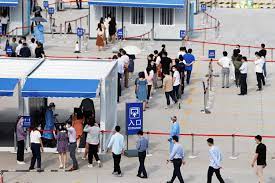NEW DELHI, April 10: While almost the entire world has come out of the Covid-related restrictions and are slowly bouncing back to pre-Covid normal life, millions of citizens of Shanghai in China are spending days under enforced quarantine facing continuing shortages of food and medicine, with China’s financial centre on Sunday reporting a record rise in COVID-19 cases.
Anger is growing among them as most of Shanghai’s 26 million residents remained confined to their apartments for the past two weeks in a harsh lockdown aimed to curb the spread. On Sunday, Shanghai reported a record 25,000 odd cases bringing the total in the current wave past 1,70,000.
Health authorities said most cases were mild, prompting many residents to question why they were being confined to their homes. The outbreak has paralysed the city’s supply chain and logistics with many now only relying on hand outs of vegetables from the government to feed their families.
Many have taken to social media to complain about no access to medicines or hospital treatments because of the lockdown. “Fears of contagion, movement restrictions both in and outside Shanghai, and questions about who can take delivery jobs and what vehicles they can drive have left the city underserved,” media reports said. “Some people stuck at home have benefited from government largess, posting pictures of impressive-looking hampers on social media. But for many residents, the only source of fresh food is now discount group-buying clubs, a pre-outbreak fixture where local community leaders contact suppliers, take orders and organise transport.”
One reason for the shortage is that the harsh “zero COVID” measures have seen many delivery workers as well as employees of delivery companies and warehouses sent to enforced quarantine. Some residents said they had been sent to quarantine centres that were not even completed, posting videos showing construction material and dirty portable toilets. The city’s separation of COVID-positive children from their parents has also evoked outrage, prompting authorities to later allow parents to be with their children if they had “special requirements.”
“The basic livelihood of the people of Shanghai is now in great trouble, and the vast majority of the people of Shanghai spend their entire lives every day looking for channels to grab food,” said one essay that went viral on WeChat. “If I didn’t know it first hand, I wouldn’t believe you if you told me that in 2022, people in a cosmopolitan city can’t buy food every day and eating is a problem, but it’s really happening. Young people are better off, they can go through various software to order, but many elderly people can’t even play with their cell phones, so it’s impossible to expect them to grab food online.”
China is the only country still isolated from the world and following this approach, which calls for mass testing and central quarantine for patients and close contacts. China has vaccinated most of its population, and studies have shown that Chinese vaccines, with three doses, are effective in preventing hospitalisation and death.
(Manas Dasgupta)

